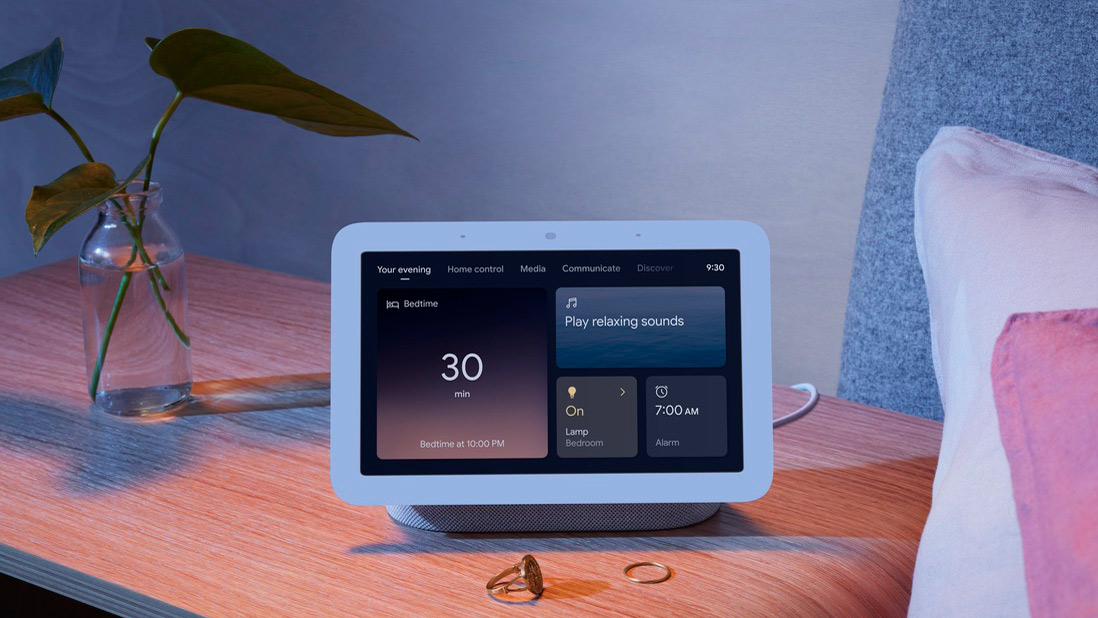Google’s newest smart display, the Google Nest Hub (2nd generation), went on sale this week, and it’s the first smart display on the market that can track your sleep. The smart display includes Soli radar technology – already present in the Google Pixel 4 and Pixel 4 XL smartphones – to monitor your breathing and movement, while the built-in microphones and ambient light and temperature sensors will detect coughing, snoring plus light and temperature changes in your bedroom.
All of this information is analyzed by the device to help you understand how much sleep you’re getting and what, if anything, is impacting its quality. But just how accurate is this sleep data when it’s captured by a device that isn’t attached to you, and is it the same as using one of the best smartwatches or best fitness trackers? Following just over a week with the Google Nest Hub (2nd generation) I’m disappointed with the results, and feel that if you share a bed then it isn’t the best option.
- Check out our round-up of the best smart displays
- Not sure whether you want a Google or Amazon smart display? Find out by reading the Google Nest Hub (2nd generation) vs Amazon Echo Show 8
- Build on your smart home with our best smart thermostats
Two in the bed
The Google Nest Hub (2nd generation) monitors the length of time spent in bed, as well as the period of that time you were actually asleep and how consistent this is with your pre-defined sleep schedule. Most of the time, this data was accurate – we wore a Fitbit Sense at the same time, comparing the results from both devices. However, there were occasions that the Google Nest Hub (2nd generation) failed to identify if I’d got up during the night; the Fitbit Sense logged these interruptions to sleep, however. Since I share a bed with my partner, it’s possible that the Google Nest Hub (2nd generation) may have been detecting my other half breathing after I’d left the bed.
When it came to sleep interruptions, the Google Nest Hub (2nd generation)’s microphone picked up snoring and coughing each night. However, it’s actually my partner who snores during the night. Unfortunately, this data was recorded in my Sleep Summary each morning as an interruption to my shut-eye, even though I’ve become used to his snoring and am rarely disturbed by it. Of course, this was always going to be an issue when enlisting a microphone for this purpose, but it still felt disappointing to see it.
The Google Nest Hub (2nd generation) can’t track sleep stages – it can’t determine the time that’s spent in light, deep, and REM sleep, which is something more wearables can. This is a shame because such data can be useful to identify patterns and variations in your sleep that you can discuss with your doctor.

Disturbing my partner
The Google Nest Hub (2nd generation) includes some handy features to help you wind down and wake-up gently (these are also available on the previous iteration, the Google Nest Hub, and the Google Nest Hub Max via a software update). One of these is the Sunrise Alarm, where the smart display’s screen starts to brighten between five and 30 minutes before the alarm sounds. I loved the idea of this feature – but my partner, who gets up later than I do, wasn’t impressed by the bedroom beginning to get brighter a good hour before he got up. As a result, I quickly disabled this feature. Once again, this reiterates the point that the Google Nest Hub doesn’t work so well if you share a bed and have different wake-up times to your partner.
Useful sleep tips
Sleep-tracking did offer some handy insights into my nightly shut-eye, though. For example, on a day where we managed to get more sleep than is necessary, the Google Nest Hub (2nd generation) provided quick access to information on the main screen of the smart display about the effects of sleeping in. It also encouraged me to stick to my schedule each day – but I can get almost all of the same information by using a smartwatch or fitness tracker to track my sleep.
There are plenty of reasons to love the Google Nest Hub (2nd generation), such as quick gestures that let you play and pause music and movies by making a tapping motion in front of the screen, or support for smart home technology, Thread. However, for me at least, sleep tracking isn’t one of them.
- Check out the best Google Home deals
from TechRadar - All the latest technology news https://ift.tt/31GZY6A
No comments:
Post a Comment